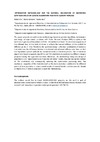Identificador persistente para citar o vincular este elemento:
https://accedacris.ulpgc.es/jspui/handle/10553/42001
| Campo DC | Valor | idioma |
|---|---|---|
| dc.contributor.author | Paz Hernández, Rubén | en_US |
| dc.contributor.author | Monzón Verona, Mario Domingo | en_US |
| dc.contributor.author | Díaz Padilla, Noelia Del Carmen | en_US |
| dc.date.accessioned | 2018-09-26T12:01:27Z | - |
| dc.date.available | 2018-09-26T12:01:27Z | - |
| dc.date.issued | 2018 | en_US |
| dc.identifier.uri | https://accedacris.ulpgc.es/handle/10553/42001 | - |
| dc.description.abstract | This paper presents an optimization methodology based on genetic algorithms, metamodels and design of experiments combined with Finite Elements Analysis (FEA) to optimize the material assignation of bioprinted scaffolds. The method optimizes the material assignation of the different bars of the strut structure to achieve the desired stiffness of the scaffold in different points of time. Therefore, the optimized design is the best combination of materials that minimizes the difference between the desired and achieved stiffness over time, so that the degradation process (4D) will be considered in the optimization process. The optimization algorithm is based on genetic algorithms and FEA simulations to evaluate the different designs proposed during the algorithm evolution. Moreover, the methodology integrates design of experiments and metamodels to estimate the simulation results, thus decreasing the number of FEA simulations and consequently reducing the optimization processing time. The mechanical properties of the materials (such as the elastic modulus) is defined in the different points of time according to experimental results of several bioinks and biomaterials. Simple configurations of struts is proposed to apply the methodology. | en_US |
| dc.language | eng | en_US |
| dc.relation | H2020-MSCA-RISE-2016-734156 | en_US |
| dc.relation | Mejora de la Biofuncionalidad de Scaffolds Polimericos Obtenidos Por Fabricacion Aditiva | en_US |
| dc.subject | 331399 Otras (especificar) | en_US |
| dc.subject.other | Optimization | en_US |
| dc.subject.other | Scaffold | en_US |
| dc.subject.other | Bioprinting | en_US |
| dc.subject.other | Genetic algorithms | en_US |
| dc.subject.other | Metamodels | en_US |
| dc.title | Optimization methodology for the material assignation of bioprinted scaffolds based on genetic algorithms and finite element analysis | en_US |
| dc.type | info:eu-repo/semantics/lecture | en_US |
| dc.type | Lecture | en_US |
| dc.relation.conference | 5th TERMIS World Congress (4-7 september), 2018 International Conference Center, Kyoto, Japón. "Integration of Industry, Government, and Academia for Regenerative Medicine" | en_US |
| dc.investigacion | Ingeniería y Arquitectura | en_US |
| dc.type2 | Ponencia | en_US |
| dc.utils.revision | Sí | en_US |
| dc.identifier.ulpgc | Sí | en_US |
| dc.contributor.buulpgc | BU-ING | en_US |
| dc.contributor.buulpgc | BU-ING | en_US |
| dc.contributor.buulpgc | BU-ING | en_US |
| dc.contributor.buulpgc | BU-ING | en_US |
| item.fulltext | Con texto completo | - |
| item.grantfulltext | open | - |
| crisitem.project.principalinvestigator | Monzón Verona, Mario Domingo | - |
| crisitem.author.dept | GIR Fabricación integrada y avanzada | - |
| crisitem.author.dept | Departamento de Ingeniería Mecánica | - |
| crisitem.author.dept | GIR Fabricación integrada y avanzada | - |
| crisitem.author.dept | Departamento de Ingeniería Mecánica | - |
| crisitem.author.dept | GIR Fabricación integrada y avanzada | - |
| crisitem.author.orcid | 0000-0003-1223-7067 | - |
| crisitem.author.orcid | 0000-0003-2736-7905 | - |
| crisitem.author.orcid | 0000-0002-1461-7752 | - |
| crisitem.author.parentorg | Departamento de Ingeniería Mecánica | - |
| crisitem.author.parentorg | Departamento de Ingeniería Mecánica | - |
| crisitem.author.parentorg | Departamento de Ingeniería Mecánica | - |
| crisitem.author.fullName | Paz Hernández, Rubén | - |
| crisitem.author.fullName | Monzón Verona, Mario Domingo | - |
| crisitem.author.fullName | Díaz Padilla,Noelia Del Carmen | - |
| Colección: | Ponencias | |
Visitas
48
actualizado el 10-ene-2026
Descargas
21
actualizado el 10-ene-2026
Google ScholarTM
Verifica
Comparte
Exporta metadatos
Los elementos en ULPGC accedaCRIS están protegidos por derechos de autor con todos los derechos reservados, a menos que se indique lo contrario.
